Spinning around almost every sphere, women play important, irreplaceable roles as key figures of society. However, women and their needs have been historically neglected in many parts of the world. Women’s health is one such essential need that has been underserved and underfunded. Femtech, a term applied to a category of software, products, and services that use technology to focus on women’s health, is a booming industry and solution to the gender health gap, revolutionizing women’s health. Overseas, especially in the United States, there has been a great upsurge in investment and enterprises in the sector along with a growing awareness of women’s healthcare needs. According to McKinsey & Company, femtech’s current market size ranges from $500 million to $1 billion. However, the industry is still in its initial phase in Korea. To delve more into this rising industry unlocking new opportunities for women, Ewha Voice took a two-week trip to New York City, the center of the flourishing femtech industry.
Elektra Health endeavors to smash menopause taboo

Photo by Kim Ha-rin
Menopause is usually not dealt with in popular culture and often kept in the shadows. But lately, there has been progress as an increasing number of companies and brands have addressed the essence of discussing the issue. In fact, the global menopause market was recently valued at a potential of $22.7 billion, according to Grand View Research, Inc., as more women reached a certain level in their careers and can now afford interesting products and try out different services.
Elektra Health is at the forefront of providing evidence-based care for women experiencing perimenopause or menopause. With the goal of smashing the menopause taboo, the company provides education and has organized a community in which individuals can freely share their symptoms and worries about menopause.
Julia Rosenbaum, marketing associate at Elektra Health, recognizes the lack of discussion around menopause and hopes women no longer feel isolated during this period of their lives.
“Around half of the population will go through menopause, and for someone to feel invisible while experiencing something so universal is sad and shocking," she said. “But it does not have to be this way. This is why Elektra is working to meet women where they are at, applying personalized services to support each individual's unique needs."
Working as a sexuality educator earlier in her career, Rosenbaum realized how important it is for education to be available at a very early age. Rosenbaum feels this issue needs to be taken seriously since she herself would not have learned about menopause until it happened to her if not for her job.
She also expressed frustration at the lack of comprehensive sex education for younger generations in the United States, as only 39 states and the District of Columbia mandate sex education, 18 require that education to be medically accurate, and a mere 11 require the importance of consent to be covered. When she met kids in diverse age groups, Rosenbaum noticed that they all wanted a space where they could ask their questions without the fear of being ridiculed or judged. Thus, creating safe spaces and understanding what it means to be truly inclusive has informed the way that she approaches her work now with people who are older.
“Women taking control of their sex and sexuality challenges our patriarchal society and the status quo,” she said. “Historically, women have been valued for what they can give. We now need to accept that our pleasure is valid even if it may not serve anyone in society other than ourselves and our bodies. That is why I emphasize the significance of education and having conversations that are not just about the science behind sexual health but also pleasure and consent.”
Femtechs are receiving spotlight for a reason. Many of the founders started off by facing a medical problem without a solution. They were born out of the gap in the typical healthcare system, wanting to bridge that, help women come together, and also experience a community for something about which they might feel isolated, like with menopause. This explains the role of Elektra, raising voices, getting angry, and demanding change. By breaking the silence and starting conversations on menopause, it intends to break the menopause taboo prevalent in society.
“Women and mothers give so much to other people, and deprioritize their own needs and desires,” Rosenbaum concluded. “But when menopause symptoms hit, you have no choice but to stop and recognize that you only have so many hours in the day. When your energy is finite, it becomes necessary to finally prioritize your own well-being."
While some think menopause is the end, a lot of people view it as a beginning to a new way of approaching life. It can be regarded as a rebirth, or transformation. Elektra wants women to know that if they try to have self-care and health in place before entering menopause, when it happens, they will not be completely overwhelmed by it.
Femtec Health uses data and technology to provide personalized healthcare solutions
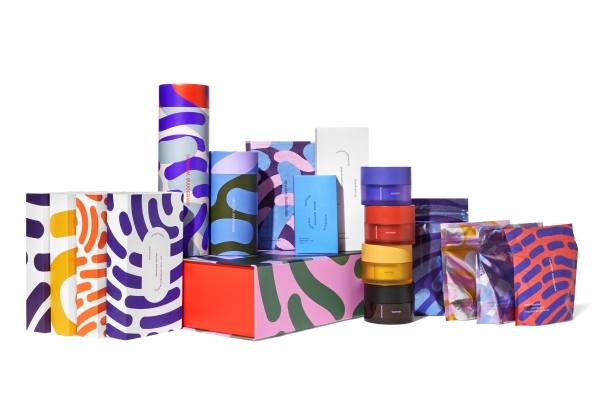
Another notable compay that is leading women’s journey throughout their lives, from specialty care and wellness to sexual awareness, is Femtec Health. In accordance with the constantly changing, sophisticated female body, healthcare also needs to change over time. This explains Femtec Health’s efforts to use technology such as AI predictive analytics to analyze individual data and come up with healthcare solutions that are personalized for each woman’s own body.
Ewha Voice interviewed Candace McDonald, Chief Impact Officer (CIO) at Femtec Health. She is in charge of deciding the causes to focus on as a company, implementing those across the mission of revolutionizing women’s healthcare, and also overseeing the PR plan of the company.
McDonald had previously worked for many other companies and noted that her past work experiences have helped her work as the CIO. Working as a professional fundraiser, she learned to understand and listen to people’s needs, which is one of the things she is able to implement at Femtec. Also, even during the pandemic, she has been able to bring camaraderie and community not only within her team but to her customers as well.
“The pandemic has taught us a lot about human contact and how we are all connected together. When we are not able to see our loved ones and friends, it really has an impact on not only your mental health, but your physical health too,” she pointed out. “I think when individuals are able to look internally at their own lives, they are able to see areas that they can reach out to and support one another in their community.”

In terms of the lack of discussion around women’s health, she believes the easiest thing that we can do globally is to talk about it. Half of the world's population is women, and it is natural that they menstruate. It should no longer be a taboo but something that is celebrated because she has initiated into something that many other women are a part of.
Health and wellness, like any industry, always have hardships and obstacles to overcome. Particularly in the femtech industry, according to McDonald, there is a need to understand that the femtech space is very fragmented as it is the point of solution care based upon one stage. What Femtec Health is trying to do is actually provide all of that care across women’s entire life journey.
McDonald thinks the increase in investment for femtech companies proves that people see the opportunity and understand where the population is. There are many amazing female founders undertaking various projects in health that have not received recognition or funding before, but the venture capital (VC) world is starting to get into it. Money will follow suit, as always, and she hopes to see private equity and VCs become more involved.
Regarding men’s involvement and gender diversity in the femtech industry, she noted that there is a lot to learn as men have had more seats at the table for a longer period of time, and that it would be challenging to get those same seats at the table unless they start to bring in some of those men.

“Initial public offers (IPOs) on a regular basis are male-led, and so few women are sitting in those top seats,” she said. “I think for our company, one of the things that is so amazing is that we were founded by a man, and we would not be where we are today without him, because he has already had six companies previously. Several of them have IPOed and what he was able to do is accelerate us to a level of being where we are today, which would have taken most companies four to six years together.”
One of the first areas Femtec Health is going to make a difference in is menstrual equity. They will be fighting against the pink tax that women still have to pay today in more than 30 U.S. states, because the pink tax not only implies tampons but also dry cleaning and just being a woman. Especially when it comes to menstrual equity, four out of five students have said that they have missed school before because they did not have the products needed. But this is a compounding factor for their education and financial capacity, so menstrual equity is the first area Femtec Health is planning to impact.
“Successful women invest back in other women”: Vagipreneur Rachel Braun Scherl
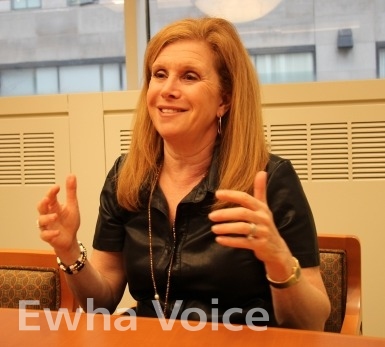
Rachel Braun Scherl, an ambitious vagipreneur, hopes to see a hugesuccess in the femtech industry. Photo by Kim Ha-rin
Building a business is hard, but building one in the unknown business world is another. When a business builder focusing on improved arousal, desire, and satisfaction in women attempted to get advertisements about a dozen years ago, 95 out of 100 media outlets said no since women’s sexuality has been considered taboo. Instead of giving up, the bold businesswoman said to herself that if she could not buy media, she would earn it and took the “uncomfortable” conversation to the media herself, which eventually made it to national television and mainstream publishers.
This is how Rachel Braun Scherl, now a multi-specialist with various titles, such as entrepreneur, marketing strategist, business builder, and femtech expert, wound up publicly speaking about the disparity between men and women’s health advertising and the importance of conversation.
Scherl has been working in women’s health for 15 years amongst her decades-long business career. After working with Johnson & Johnson on women’s health for 27 years, in 2008, Scherl went on to build a company “by women, for women to improve arousal, desire, and satisfaction.” That is when she became “Vagipreneur,” an entrepreneur focused on the business of female sexual health and wellness.
“At that point, there was very little conversation,” Scherl said. “The opportunity to offer solutions in a place where there was not a lot of conversation in an exciting, engaging category just seemed like the perfect storm. I have stayed and focused on companies in the space since then.”
Scherl feels femtech is a space where the business opportunities are huge. According to her, the ability to make an impact financially, professionally, personally, and healthwise is pretty extraordinary as half of the world population experiences female health issues like menopause, mistimed and pregnancies.
Moreover, what’s fascinating about women’s healthcare business is that it is not just one thing but multi-system related, which means the companies have “the wind at their back.”
“For instance, if a woman suffers from incontinence, she might have urine leakage, but she also has anxiety because she does not know if she can go out and do her life,” Scherl said. “We are just really at the beginning of being able to have these conversations and building companies to respond to those issues. What’s exciting is the opportunity to provide solutions in huge unmet-need categories that really solve important problems and are huge economic opportunities.”
Aside from building companies herself, Scherl works to promote the space of women’s sexual health and wellness, such as co-hosting a podcast on femtech, speaking at conferences, and authoring a book on women’s health business.
Scherl is currently co-hosting a podcast on women’s health and wellness called “Business of the V” with Dr. Alyssa Dweck, featuring inventors, investors, thought leaders, and healthcare professionals in the femtech business.
“Rather than running headlong into the same barriers that we’ve all done, but paying it forward, so that each new round of entrepreneurs faces fewer and fewer of these challenges,” Scherl said. “More holistically, if we can have some impact on making the conversations about sexual reproductive health to be more comfortable, more informed, and more accessible through the podcast, that, to me, would be an enormous victory.”
When asked if she believes femtech would eventually promote and improve women’s rights in our society, she answered, “100 percent.” Scherl explained that when you have options about how you want to make choices, it gives you more choices, whether it is contraception, menstrual pain, or in-vitro fertilization.
“And there is an economic argument to be made, which is one of the reasons that femtech works. We want to keep these talented women in the workforce,” Scherl said. “How do we set up options for the women so that they can stay as they progress and mature through their life? Wouldn’t it be important to find a way to enable them to contribute?”
Scherl revealed that one of her ultimate goals in the femtech industry is to see great success in the space so that funding no longer becomes an issue. As she herself experienced the difficulties of fundraising and access to advertising channels, she hopes that the industry becomes so powerful and important that they break down many barriers that exist in the business world right now.
“Things that are and historically have been particularly difficult but are getting better in women’s health are fundraising and access to advertising channels,” Scherl said. “I do think what I am doing now is changing the dialogue and capitalizing the business opportunity because I do think one of the things that happens when women become successful is they often invest back in other women. So, in addition to solving problems, learning things, and making money, it also gives you an opportunity to put it back into the system.”
Scherl concluded the interview by providing heartfelt business advice to those who are dreaming of starting their own femtech business.
“I would say, just do not take ‘no’ for an answer because someone is going to get your ‘yes,’” Scherl said. “If you knock on one hundred doors and get turned down for financing, it might be the hundred and first. There is really an endurance, focus and discipline that you need to have. All those tied together, you really cannot give up.”
Looking into the industry with a venture capitalist: Albert Wenger
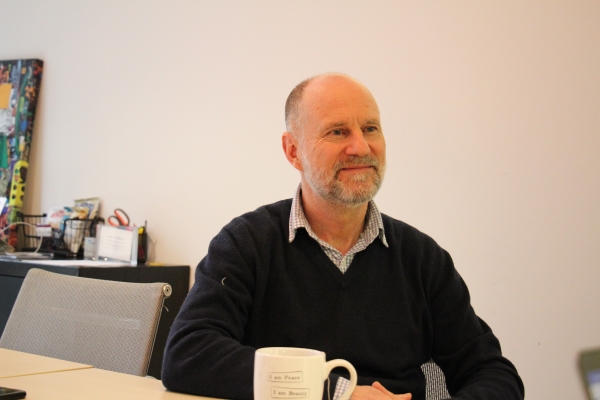
Photo by Yoon Na-hyun
We live in a world full of startups. However, there’s a complication: starting a company may be easy, but expanding it and succeeding is not. This is where the investors come in. With years of experience, they see hope in startups and loss-making firms and guide the entrepreneurs in the right direction by investing in them.
Albert Wenger, a managing partner at Union Square Ventures (USV), kicked off his career as founder and co-founder of diverse companies such as management consulting firms and data analytics companies. Eventually, in pursuit of his love for startups, he decided to work with them by becoming a venture capitalist. Currently, USV is one of the leading investors in femtech startups.
“When we entered this area, the term ‘femtech’ did not even exist yet,” Wenger noted. “We invested in Clue, a period tracking app founded by Ida Tin, who is credited with coining the term ‘femtech.’ The investment made us realize that femtech ought to be a much bigger category and led us to other investments. Aside from Clue, we invested in Glow, a fertility app that helps users take control of their reproductive health; Nurx, which allows women to get birth control pills online; and Modern Fertility, a reproductive health company.”
Wenger highlighted that the investments were a result of his family trip to Kenya. Contrary to the northern part of Kenya, people in the southern part were able to use phones and had access to the visa payment system. Female health was often a taboo topic in these areas and Wenger thought the devices could provide a whole new way to access this type of knowledge. The increasing number of girls dropping out of school as they enter higher grades due to menstruation revealed the reality of the social stigma around the topic and the scarcity of period supplies.
“The credit for the sudden increase of interest regarding femtech among VCs should go to the entrepreneurs,” Wenger claimed. “Capital tends to follow the entrepreneurs, not the other way around. We are not the ones who catalyzed this. It is the entrepreneurs who blazed the trail, and we are trying to come along.”
Nevertheless, he also pointed out the persistent challenge of the gender gap in the VC industry; some ideas are receiving less funding because of the ultimate bias against female entrepreneurs. By highlighting the relatively slow change in the industry, Wenger remarked that the problem is not necessarily about the change within VCs; it is about change in society in a broader sense.
“Even though societal change is the essential solution to increased gender equality, femtech is a major contributor as well,” Wenger stated. “In particular, helping women take control of their reproduction to be better informed is very meaningful. Women disproportionately carry the cost of pregnancy relative to men, so technology can lend a hand in this aspect.”
Apart from the fertility sector, portions of sex tech are adjacent to femtech. A number of venture firms have a morality clause in their limited partner agreements and therefore fear to fund a sex tech company in case it causes trouble for their limited partners. Moreover, parts of femtech involving an aging population like the menopause products also have a harder time raising money. In spite of these hardships, Wenger claims that the landscape will eventually map out once people realize that it is a bona fide field.
Wenger also shared his thoughts on the controversial opinions about the future of femtech.
“There was a very funny moment when we first announced our investment in Clue,” he said, chuckling. “A comment on Hacker News said that VCs are getting more mannish as they invest in femtechs. Somebody else wrote that women may be niche for you, but the fact is they make up roughly half of the global population. I personally think these markets are vast. Anybody who thinks that there are some kind of constraints on the market size is not looking at the reality.”
Wenger ended the interview with helpful tips for students interested in femtech.
“My suggestion is to follow leaders in space like Ida Tin,” he said. “See what they are doing and what they are working on. Find female leaders in the space and follow them on social media. I think it’s the best way to stay up to speed.”
“The domestic femtech industry is improving but still has a long way to go”

On Jan. 21, Ewha Voice sat down with Park Jiwon, the CEO of SAIB & Co., a femtech company specializing in safe chemical-free condoms for women in Korea.
While working as a professor in the United States some years back, Park was shocked to learn how openly American students talk about their sexual health and preferences. Unlike the conservative Korean society, where sex is considered a taboo especially for women, in the U.S., ignorance of sex is regarded as something to be ashamed of.
Looking back, Park too recognized her lack of knowledge about sex. The absence of informative and open discussions about sex at school, at home, and in society more generally often snowballs to students and possibly adults not knowing how to practice safe sex or how to prevent infections. This idea led Park to initiate change by developing the ultimate solution: SAIB & Co.
The sexual wellness brand features safe condoms for women, “natural soothing gel” also known as “love gel,” and feminine cleansers, all designed for female health without harmful chemicals. Their latest product, “Solid Feminine Wash CranProB™” is a solid type disposable feminine cleanser that dissolves in water. With its zero waste packaging and patented ingredient CranProB™, it aims to help women by enabling vegan lactobacillus to be absorbed in the body instead of harmful chemicals.
Regarding the femtech industry and its global market, Park highlighted the origin of femtech and why the term was coined.
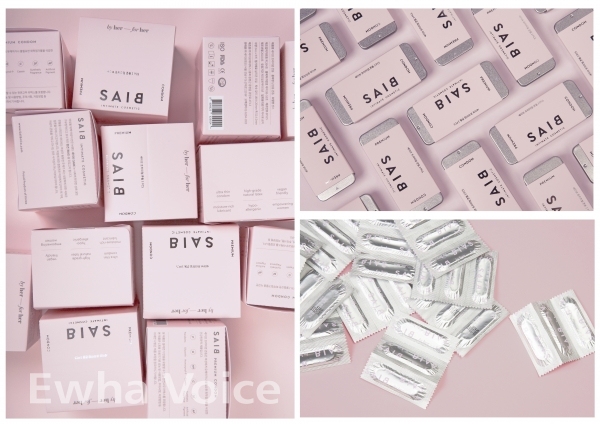
“Femtech is the health and wellness industry for women,” Park stated. “So, when we think of the reason for its creation, it is, as a matter of fact, confusing because the health and wellness industry has existed for a long time. The only possible reason is that categories considered women’s health in the existing industry were too weak.”
Bias against sex and gender, especially against women and girls, goes back a long way in Korea. As stated by Park, Confucianism plays a considerable role in the discrimination against women’s sex. The patriarchal culture where women were considered as helpless beings against their husbands and fathers was largely influenced by Confucianism. This societal norm still dominates modern society. Even until now, there are certain remaining cultures such as women practicing chastity before marriage and men being more open about their sex lives than women.
Park’s effort to tackle the prejudiced views of women’s sex goes back to her early days in business. She noted that knocking on the doors of the manufacturing companies was not at all easy. The main products, chemical-free condoms, were unfamiliar to the manufacturers, and therefore viewed unfavorably. From the manufacturer’s view, a newcomer suddenly introducing a whole new product totally different from the condoms they had been producing for a long time might not have been a welcome gift.
“What we are talking about is a socio-cultural problem,” Park stated. “When it comes to these issues, the essential solution is to change people’s perception and recognition. Femtech can lend a hand in solving this problem, but it is difficult for it to resolve the problem entirely.”
While positive changes such as the emergence of diverse femtech startups and funds are occurring in the domestic femtech industry, there are still some shortcomings that should be addressed. Contrary to the foreign femtech markets, where sectors such as sex toys and menopause are being discussed freely, Park stated that femtechs in Korea are mostly confined to menstruation products because they are relatively easy to understand. Furthermore, while diverse venture funds do exist domestically, most of them are focused on the IT sector. Even though funds concentrating on industries with women CEOs are on the rise, femtech funds still have a long way to go.

Park pointed out that the femtech industry reminds her of the mental health industry a decade ago. Unlike the present day where it is considered normal for people to get medicated for diseases such as insomnia, people with mental illness in the past chose to suffer in silence due to the social stigma. She states that there will definitely be a time when sexual health is recognized as the health that one has to take care of, rather than something to be ashamed of, just like mental health.
By highlighting the potential of the femtech industry, Park mentioned the dire need of quality products and services. As it is in the process of growing, Park hopes people will become more interested in the issue and immerse themselves in femtech.
“A woman’s body undergoes many physical changes in her lifetime: menstruation, pregnancy, childbirth, and menopause. I wish SAIB & Co. could age with its customers by releasing products that can aid them as they grow older.”
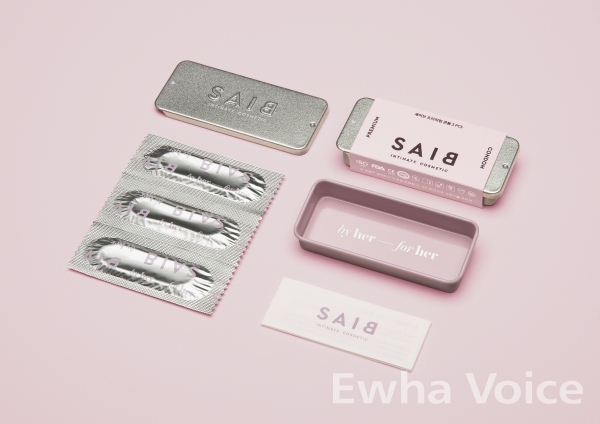
“Femtech is the health and wellness industry for women. So, when we think of the reason for its creation, it is, as a matter of fact, confusing because the health and wellness industry has existed for a long time. The only possible reason is because categories considered women’s health in the existing industry were too weak.”

